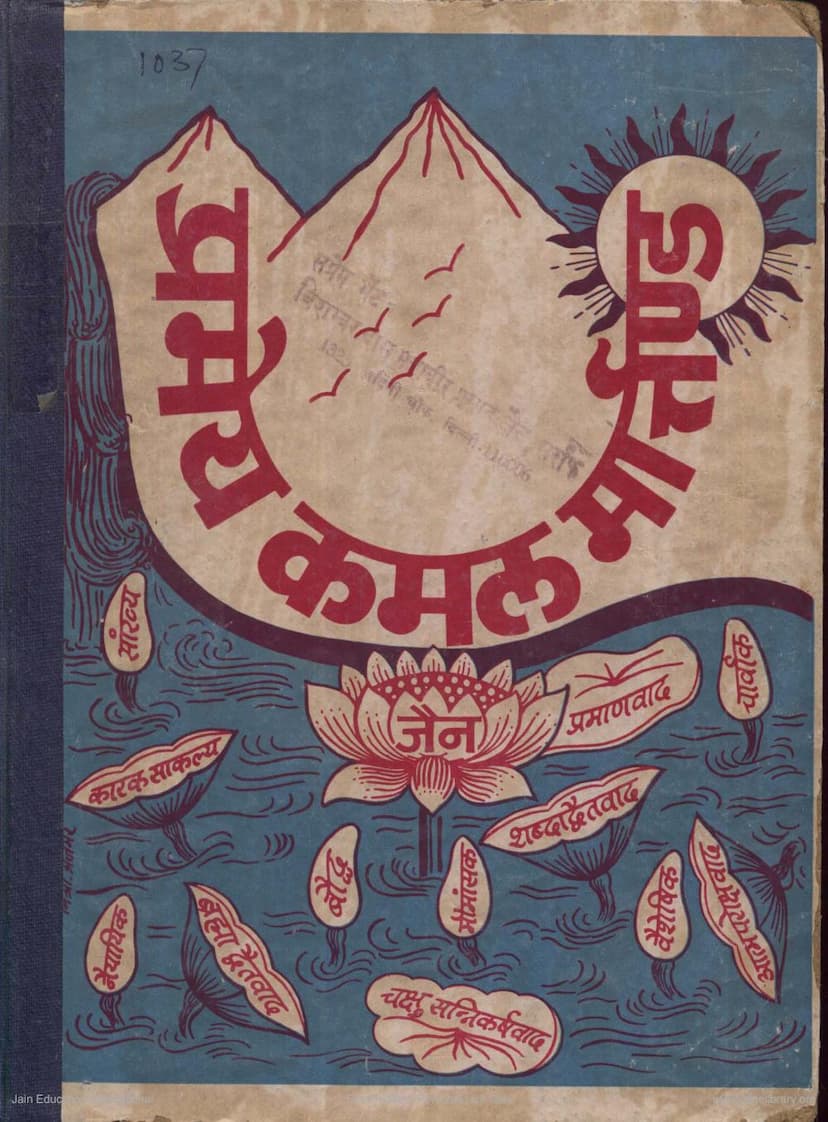Pramey Kamal Marttand Part 1
Added to library: September 2, 2025

Summary
This is a comprehensive summary of "Pramey Kamal Marttand Part 1," based on the provided text:
Book Title: Pramey Kamal Marttand Part 1 Author(s): Prabhachandracharya, Jinmati Mata (Translator) Publisher: Lala Mussaddilal Jain Charitable Trust Delhi Catalog Link: https://jainqq.org/explore/001276/1
This work is a detailed commentary on the "Parikshamukh" sutras by Manikyanandi Acharya. It is a foundational text in Jain logic and epistemology (Nyaya Shastra), a branch of knowledge that emerged from the "Drishtivada," the last Anga of the twelve Angas of the Jain Agamas. The core philosophy of Jain Nyaya, as reflected in this text, is Syadvada and Anekantavada, which form the bedrock of its principles. The book aims to establish correct knowledge about cause and effect, refute fallacious arguments, and clarify the principles of Jain philosophy.
Key Aspects and Structure:
- Purpose: The text serves as a vital resource for understanding the nuances of Jain logic, refuting external philosophical viewpoints, and establishing the truth of Jain doctrines. It highlights the inadequacy of other philosophical schools (Darshanas) when their arguments are subjected to Jain reasoning, especially concerning the nature of knowledge and reality.
- Commentary: "Pramey Kamal Marttand" is a monumental commentary by Prabhachandracharya on Manikyanandi's "Parikshamukh." While "Parikshamukh" is a concise treatise (a "small pitcher filling an ocean"), Prabhachandracharya's commentary is vast, estimated to be around 12,000 verses long. It is named "Marttand" (Sun) because, like the sun dispelling darkness, it illuminates and clarifies the "prameyas" (objects of knowledge) and the principles of valid cognition.
- Translation: The Hindi translation by Aryika Jinmatiji Mataji is a significant contribution, making this profound Sanskrit work accessible to a wider audience, particularly students and scholars of Hindi. This translation was undertaken at the inspiration of Aryika Gyantmati Mataji.
- Core Subject Matter (Volume 1): Volume 1 of "Pramey Kamal Marttand" primarily focuses on the theory of Pramana (valid cognition) as expounded in the initial chapters of "Parikshamukh." It delves into:
- Definition of Pramana: Establishing that knowledge itself is the Pramana.
- Refutation of Other Schools: The text meticulously dissects and refutes the theories of various Indian philosophical schools regarding the nature of Pramana. This includes:
-
Materialistic Schools (Chavaka/Lokayata): Their view that "Karak Sankalya" (the entirety of causal factors) constitutes Pramana is refuted.
-
Vaishēśika: Their belief that "Sannikarsa" (contact) is Pramana is rejected.
-
Samkhya: Their theory that "Indriya Vritti" (the function of sense organs) is Pramana is refuted.
-
Prabhakara (Mimamsaka): Their view of "Jnatri Vyapar" (the activity of the knower) as Pramana is countered.
-
Buddhism: Various Buddhist theories are addressed, including "Nirvikalpa Pratyaksha" (non-conceptual direct perception), "Shabdadvaitavada" (the world as manifestation of sound/word), "Vijnanadvaita" (idealism where only consciousness exists), "Chitrādvaita" (consciousness with manifold forms), "Shunyadvaita" (nihilism), and the refutation of their atomistic and causal theories.
-
Vedanta (Brahma-advaita): The monistic view of the world as Brahman is refuted, and the Jain perspective on reality is asserted.
-
Mimamsa (Bhatta and Prabhakara): Their specific theories on "Apūrvārthavāda" (Pramana cognizing only the novel), "Smriti Pramosha" (forgetting as a source of error), "Prāmāṇyavāda" (self-validity of knowledge), and the nature of "Abhāva" (non-existence) are critically examined and refuted.
-
Nyaya: Their emphasis on "Sannikarsa" and the concept of "Jnānantaravedya" (knowledge known by other knowledge) is challenged.
-
- Analysis of Key Concepts: The text systematically debates and dismantles theories related to:
- Causality (Kāraka Sankalya): Refuting the idea that the combined causal factors alone constitute valid knowledge.
- Perception (Pratyaksha): Debating the nature of direct perception, including whether it is conceptual or non-conceptual, and the role of sense organs.
- Knowledge of Self (Svasamvedana): Arguing for the self-cognizant nature of consciousness, refuting the view that knowledge is ultimately known by another knowledge.
- The Nature of Knowledge: Addressing whether knowledge is inherently conscious or unconscious, and whether it is shaped by objects or by internal capacities.
- The Role of Language (Shabda): Refuting the Shabdadvaita view that the entire reality is linguistic.
- The Problem of Error (Viparyaya): Analyzing various theories of error and establishing the Jain explanation.
- The Nature of Pramana: Emphasizing that knowledge itself, when valid and conforming to reality, is the Pramana, not merely its causes or its results.
- Structure of Volume 1: The first volume covers the initial chapters of "Parikshamukh," dealing with the definition of Pramana and refuting various philosophical positions on its nature and scope. The detailed table of contents provided (pages 32-48) outlines the numerous "Prakarana" (topics) covered, demonstrating the comprehensive nature of the analysis.
- Key Figures: The work acknowledges the lineage of Jain scholars, including Manikyanandi Acharya, Prabhachandracharya (the author of the original commentary), and the translator Aryika Jinmatiji Mataji, and the inspiring Aryika Gyantmati Mataji. It also references and refutes the views of prominent philosophers from other Indian traditions like Gautama (Nyaya), Kanada (Vaisheshika), Kapila (Samkhya), Patanjali (Yoga), Jaimini (Mimamsa), Buddha, and Shankara.
- Intellectual Rigor: The text is characterized by its rigorous dialectical approach, presenting the "purvapaksha" (opponent's view) in detail before systematically refuting it with logical arguments and Jain principles.
Significance:
"Pramey Kamal Marttand Part 1" is a cornerstone of Jain philosophical literature. It not only elucidates the sophisticated logical framework of Jainism but also provides a comprehensive critique of competing philosophical systems, solidifying Jain epistemology as a distinct and powerful intellectual tradition. The translation makes this invaluable knowledge accessible, contributing to the propagation and study of Jain philosophy.